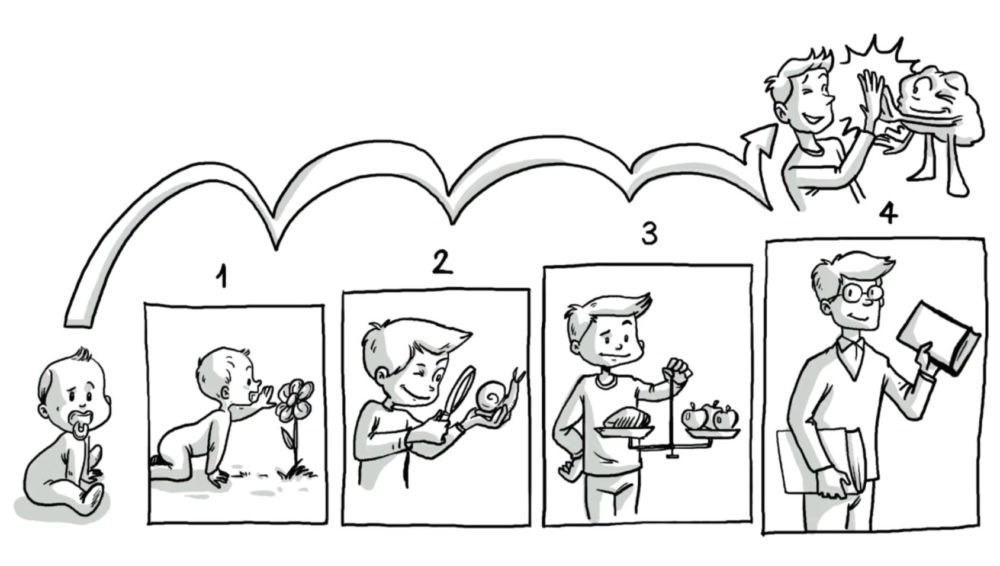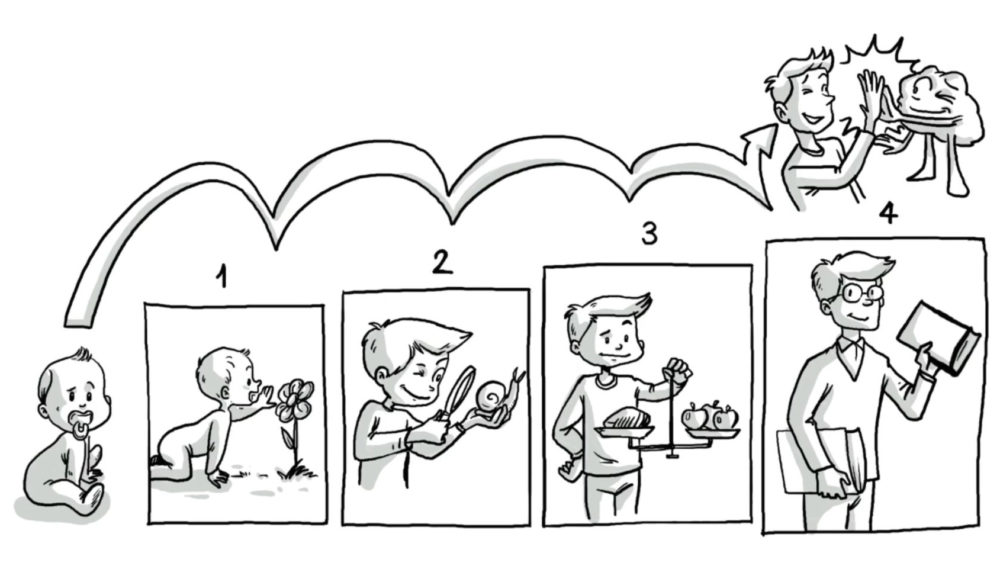Jean Piaget’s Theory of Cognitive Development


Children’s cognitive development process can be complex and subtle. Nevertheless, parents can understand this journey by understanding how Jean Piaget divided them into 4 phases.
Piaget’s theory argues that we have to conquer 4 stages of cognitive development: Sensorimotor Stage, Preoperational Stage, Concrete Operational Stage and, Formal Operational Stage. Only once we have gone through all the stages, at what age can vary, we are able to reach full human intelligence.
Sensori-motor stage (age 0 – 2)
In the sensorimotor stage, we develop, through experiences and movement, our five senses: our brain wants to see, hear, smell, taste, and touch as much as possible. First, we start with simple reflexes, and soon after we develop our first habits. From four months old, we become aware of things beyond our own body, and then as we get older, we learn to do things intentionally. A key milestone in the development of working memory, or in Piaget‘s terms, is our realization of object permanence. Before that, our mom can show and then hide a teddy, and we would think it’s gone. Afterwards, we understand that objects continue to exist, even when we can’t see them.
We start becoming curious about everything, we want to smell flowers, taste food, listen to sounds, and talk to strangers. To explore more, we move. We learn to sit, crawl, stand, walk and even run. This increased physical mobility consequently leads to increased cognitive development. But we remain egocentric, meaning we can perceive the world only from our own point of view.
Preoperational stage (age 2 – 7)
Our thinking is mainly categorized through Symbolic Functions and Intuitive Thoughts. We have lots of fantasies and believe objects are alive. As we are not able to apply specific cognitive operations, Piaget called this stage preoperational. We learn to speak and understand that words, images, and gestures are symbols for something else. When we draw our family, we are not concerned about drawing each person to scale, but rather with their symbolic meanings. We love to play pretend, which allows us to experience something new and learn a lot.
At around age four, most of us become very curious and ask many questions – we want to know everything. We can call it the birth of primitive reasoning. Piaget called it the ‘intuitive’ age because while we realize that we have a vast amount of knowledge, we have no idea how we acquired it. Our thinking at this stage is still pretty egocentric. We think others see the world as we do, and still don’t understand that they see it differently.
Concrete operational stage (age 7 – 11)
We finally discover logic and we develop concrete cognitive operations, such as sorting objects in a certain order. One example of this is inductive reasoning – which means that if we see someone eating a cookie, we can draw a conclusion and then make a generalization. And we now get the concept of ‘conservation’. We understand that if we pour orange juice from a normal glass to a taller one, the amount stays the same. Our younger sister will pick the taller glass, thinking she gets more. By the same logic, we only now can understand that if 3+5 = 8, then 8-3 must equal 5.
Our brain learns to rearrange our thoughts, to classify and build concrete operational mental structures. For example, we now know that we can reverse action by doing the opposite. Excited by our new mental abilities, we apply them in conversations, activities, when we learn to write, and in school. As a result, we get to know ourselves better. We begin to understand that our thoughts and feelings are unique and not necessarily those of others. That means that we learn to put ourselves in someone else’s shoes.
Formal operational stage (age 12 up)
Once we become teenagers, we become formally operational. We now have the ability to “think more rationally about abstract concepts and hypothetical events”. Our advanced cognitive abilities allow us to understand abstract concepts such as success and failure, love and hate. We form a deeper understanding of our own identity and morality. We now also think that we understand why people behave the way they behave and as a result can become more compassionate. Our brain now can do deductive reasoning, which means we can compare two statements and reach a logical generalization. Our new mental skills allow us to plan our life systemically and prioritize. And we can make assumptions about events that have no necessary relation to reality. We can now also philosophize and just think about thinking itself.
Our new sense of our identity now also creates egocentric thoughts and some start to see an imaginary audience watching them all the time. Piaget believed in lifelong learning but insisted that the formal operational stage is the final stage of our cognitive development.
Background
Jean Piaget’s first interests were animals and he published his first scientific paper on albino sparrows in 1907 when he was just 11 years old. In 1920, he began working with standardized intelligence tests. He realized that younger children consistently make types of mistakes that older children do not. He concluded that they must think differently and spent the rest of his life studying the intellectual development of children.



